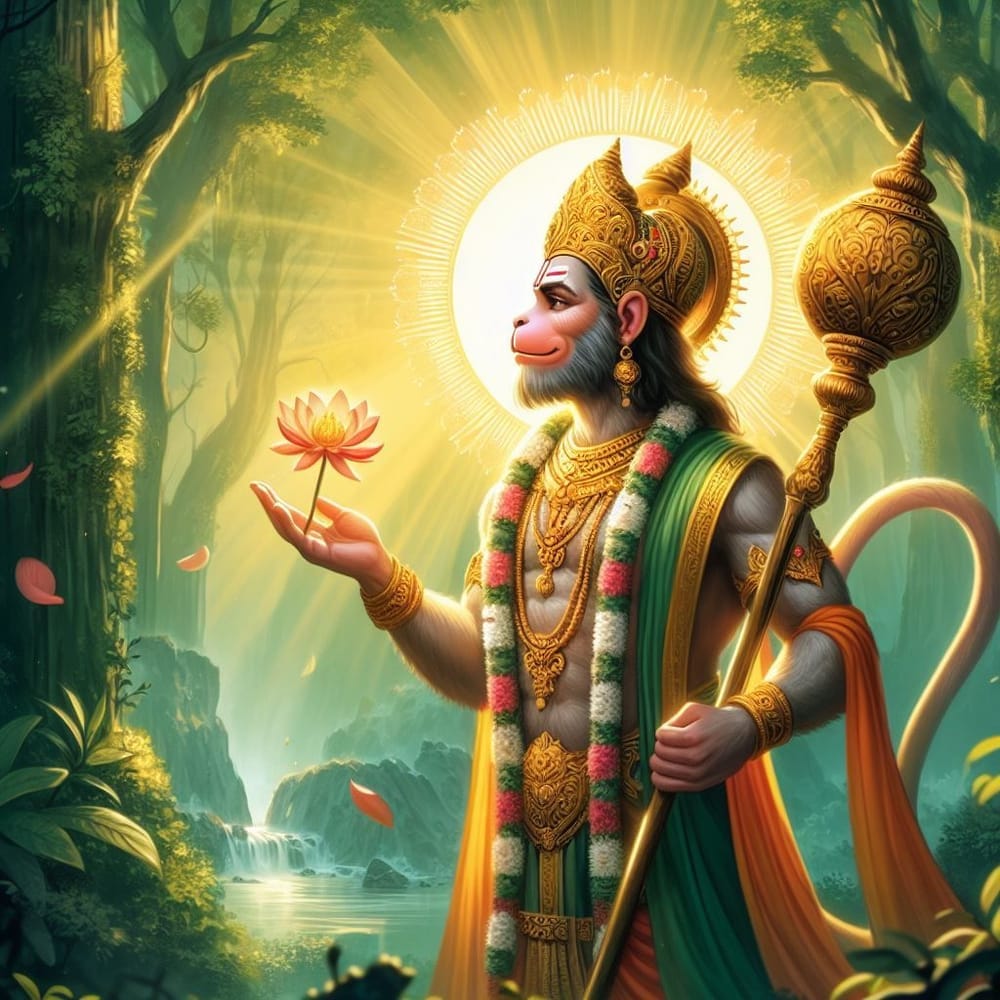When is Hanuman Jayanti in 2024?
Hanuman Jayanti, the birth anniversary of Lord Hanuman, is a major Hindu festival celebrated with immense devotion and enthusiasm across the world. It's a day to honor and seek blessings and protection from Lord Hanuman. In 2024, Hanuman Jayanti is being celebrated on April 23rd. According to the Hindu Lunar calendar Hanuman was born on the Poornima Tithi of Shukla Paksha during the month of Chaitra.

Who is Hanuman?
The best introduction of Hanuman has to be that He is the greatest devotee of Lord Ram, and that is the primary reason people love and worship Hanuman. It is said that in order to please Ram, one needs to first please Hanuman. Hanuman is known by several names like Anjaneya, Maruti, Kesari Nandan, Bajrang Bali, etc. Here are some interesting facts about Hanuman's birth, characteristics and almightiness.
Hanuman is born to king Kesari and Anjana: Hanuman was born in the same era as Ram. His father Kesari was a King in the Vanara clan.
Hanuman is also the son of Varun (wind god): According to Hindu mythology, Anjana was a celestial apsara (nymph) who had been cursed by a sage to be born as a monkey on earth. She later married to Kesari, a monkey king. However, she prayed to Varun (wind god), the wind god, for a divine child, and as a result, Hanuman was born with the blessings and essence of the wind. Because he was born with the blessing of the wind, he had the courage and strength of the raging wind, and is also referred to as Pavan Putra - Son of wind god.
Hanuman is an avatar of Shiva: It is said that Shiva wanted to assist Vishnu when he descended as Ram avatar on this planet and so he took avatar as Hanuman. However, texts from regions in south India, indicate that Hanuman is a union of Vishnu and Shiva, or associated with the origin of Ayyappa.
Hanuman is the possessor of immense mystic abilities: There's story behind how Hanuman became the possessor of enormous mystic abilities. One morning, little Hanuman, feeling extremely hungry and unable to locate his mother or any food, left his house. He observed the magnificent sunrise, with the sun painted in a beautiful shade of red, illuminating the morning sky. Believing it to be a tasty fruit, Hanuman made several attempts to grab it.
In his concern for the safety of his abode, Indra, the god of the heavens, threw his weapon, Vajra, at Hanuman, hitting him on the jaw and knocking him unconscious. This annoys Hanuman's father Varun devata (wind god), he deprives the earth of all its air. There is panic all around and living beings start suffocating. Lord Shiva intervened and Indra, filled with regret, granted Hanuman a boon that made his body stronger than Indra's Vajra. Other gods also granted Hanuman protection from fire, water, air, and any element of nature, as well as all types of weapons. He was also endowed with the ability to change his form at will, travel anywhere at any time, enjoy good health, and above all, become immortal.
Hanuman is Chiranjivi: Hanuman is believed to be Chiranjeevi, that is, the one who lives forever and hence, is believed to be physically present on earth to receive our prayers in person and shower his blessings on us.
Hanuman is forever hungry to listen to Ram Katha (Ramayana): Hanuman has a fondness for hearing Ram Katha and is said to be present anywhere the Ram Katha is being related. At the Ram Katha venue, it is customary to reserve a seat specifically for Hanuman, and an invocation is performed at the start of the Katha to formally invite him and offer him the seat.
Watch this video as Swami Mukundananda narrates a story related to Hanuman being present during Ram Katha events.
Hanuman Jayanti 2024 - celebrate by listening to this inspiring story.
Hanuman's Legacy in the Ramayana - hero of Sundarkand
Hanuman is the popular and favorite hero of the Sundar Kand of the epic Ramayana. Hanuman, blessed with immense strength, intelligence, and unwavering devotion to Rama, undertakes a seemingly impossible mission of crossing over the vast ocean and subsequently enter into the heavily fortified island kingdom of Lanka and find Sita.
Hindus chant the Sundarkand of Ramayana with great reverence and devotion towards Hanuman.
Read Ramayana short story, including Sundarkand summary here.
Sundarkand lyrics with meaning in english here.

Religious significance of Hanuman Jayanti
Hanuman is regarded as a mighty God and is very widely worshipped by people of Hindu origin and beyond. Devotees believe worshipping Hanuman, especially on his birthday, would help instill courage, strength, confidence, and reduce the malefic effects of planet Saturn in their birth chart.
It is also believed that the prayers made to him on the day of Hanuman Jayanti will be many times more effective and hence people chant the name of Hanuman and sing hymns in his praise, as many times as possible on this auspicious day.
They hope to seek blessings from hanuman to achieve success in their endeavors and get protection from evil and negative energies. Some people also worship Hanuman to seek mystic abilities.
Spiritual significance of Hanuman Jayanti
In addition to religious practices, Hanuman Jayanti serves as a platform for contemplating the values exemplified by Hanuman. Regardless of one's faith or origin, these values hold profound spiritual meaning for all of humanity.
Swami Mukundananda encourages us to use Hanuman Jayanti as a reminder to cultivate virtues such as compassion, humility, courage, perseverance and selflessness.
Life Lessons from Hanuman to apply in our lives:
- Unwavering Devotion Hanuman's dedication to Rama is unparalleled. He serves Rama not out of obligation, but out of pure love and devotion. This unwavering loyalty serves as a reminder of the importance of commitment and dedication in our own lives, whether towards our loved ones, our careers, or our goals.
- Selfless Service Hanuman's actions are driven by a desire to serve Rama without expecting anything in return. He exemplifies the concept of "seva" (selfless service) – a core principle in Hinduism. Hanuman Jayanti reminds us to put the needs of others before our own and to contribute positively to the world around us.
- Strength and Perseverance Hanuman possesses immense physical strength, but his true strength lies in his unwavering determination and perseverance. He faces challenges head-on, never giving up despite the odds. Hanuman Jayanti inspires us to face our own challenges with courage and overcome obstacles through perseverance.
- Wisdom and Intelligence Hanuman is not just strong but also wise and intelligent. He uses his wit and strategic thinking to overcome challenges, as seen in his successful infiltration of Lanka. This aspect of Hanuman reminds us to approach life's situations with both strength and intelligence.
- Humility Despite his immense power, Hanuman remains humble and ever-respectful towards Rama and others. This humility serves as a reminder that true strength lies not in arrogance but in acknowledging our limitations and respecting others.
Hanuman Jayanti Significance
According to Swami Mukundananda, Hanuman Jayanti provides us with an opportunity to grow as individuals and deepen our devotion and service towards God and Guru.
As we immerse ourselves in the celebrations of Hanuman Jayanti in 2024, let us reflect on Hanuman's timeless teachings and strive to emulate his noble qualities in our thoughts, words, and deeds.
Read How to overcome obstacles in life - Practical lessons from Hanuman's journey in Sunderkand.
How to celebrate Hanuman Jayanti
Hanuman Jayanti is a vibrant festival observed with devotion and joy. Some visit the temples to perform poojas and rituals while others chose to celebrate at home with close family.
Hanuman Deity Pooja and abhishek: Devotees visit temples dedicated to Hanuman, offering prayers and performing special poojas (worship rituals) and Abhishek. Hanuman Pooja is customarily performed before sunrise by chanting Hanuman Chalisa. Performing Hanuman Pooja is said to remove fears and worries, reduce the effect of negative placement of planets in one's horoscope, bring wealth and health and upcoming hardships and obstacles are dissoved.
Fasting: Many devotees also observe a fast or abstain from certain foods as a way to express their devotion.
Prasad offering during Hanuman Jayanti celebrations: Traditionally various types of sweets are offered on Hanuman Jayanti as Prasad - Besan Laddoo, Motichoor Laddoo, Boondi, Roat, Imarti, Kesari Bhaat, Sabudana Kheer, etc.
Basil, cloves and beetle leaves (paan leaves) are also offered as prasad.
Healthier versions of prasad like banana and other fresh fruits, dry fruits, coconut, etc. can also be offered.
Kirtan chanting: Kirtans in praise of Hanuman and Lord Ram is also a common practice on Hanuman Jayanti.
Hanuman idol worship with Sindoor: There is a custom of offering Sindoor (Vermilion) to Hanuman on Hanuman Jayanti. Read devotional story about why Sindoor is offered to the Hanuman idol.
Chanting of Sundarkand: The Sundar Kand of the epic Ramayana is a tale of Hanuman's courageous journey to Lanka. Devotees chant multiple rounds of Sunder Kand (Path) on Hanuman Jayanti.
Chanting Hanuman Chalisa: Repeated recitation of the Hanuman Chalisa, a devotional hymn dedicated to Hanuman, is a common practice on the Hanuman Jayanti day. Read Benefits of chanting Hanuman Chalisa here.
Chant the Hanuman Chalisa along with the famed Bollywood playback singer Richa Sharma, also Featuring Swami Mukundanada!
Hanuman Jayanti 2024 - Chanting Hanuman Chalisa
In Conclusion: Hanuman's character and the values he represents, resonate with people from all walks of life. His message of unwavering devotion, selfless service, and facing challenges with courage transcends religious and cultural boundaries. By celebrating Hanuman Jayanti, we not only honor a legendary figure but also commit ourselves to living a life guided by his noble qualities.
Hanuman Jayanti is more than just a religious festival; it's a call to action. It's a day to reflect on the values Hanuman embodies – values that can guide us towards a more meaningful and fulfilling life.
This Hanuman Jayanti let us seek the blessing of Hanuman to help us attain the divine service of God!

